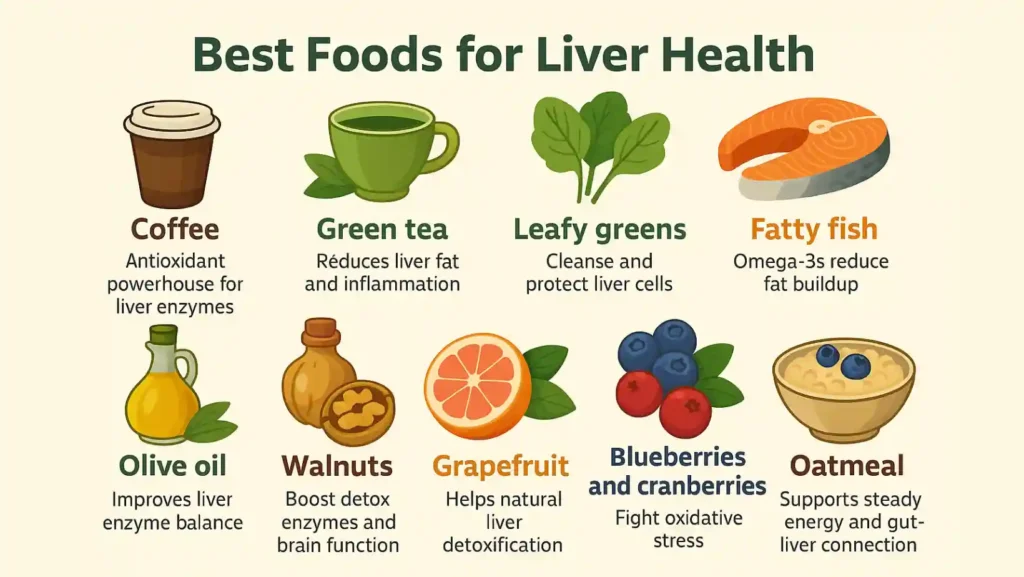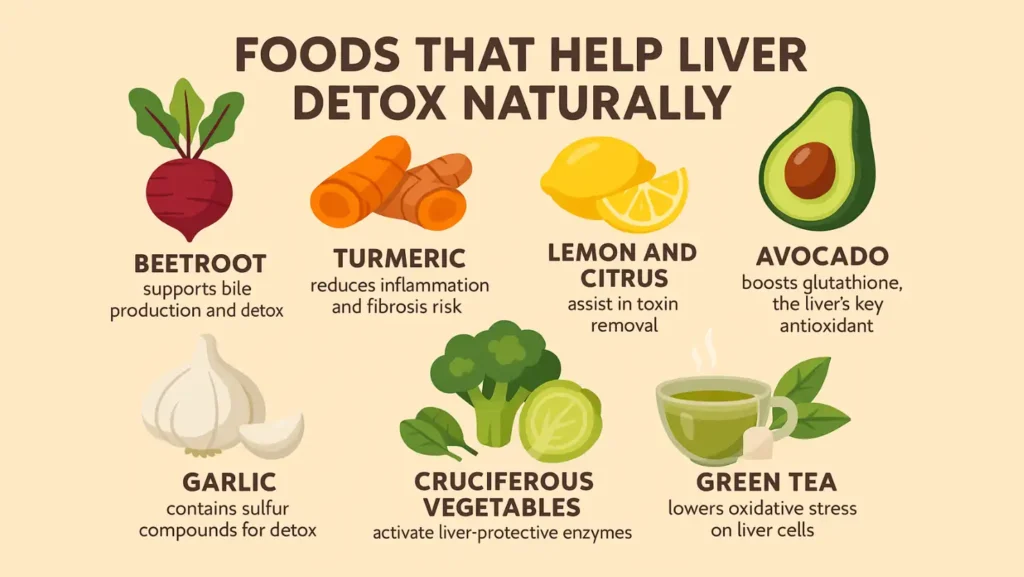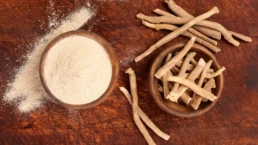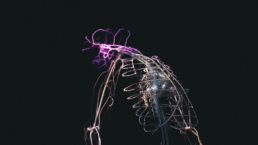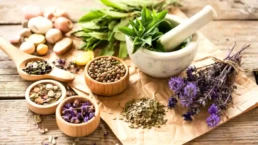Eating foods for a healthy liver is a way to lower fat in your liver, reduce inflammation, and support its daily clean-up work. You do this with plants, lean protein, whole grains, and smart fats. You drink water, skip sugary drinks, and keep alcohol at zero or near zero. You move your body most days. You sleep well.
Table of Contents
ToggleThese steps help your liver process toxins, make bile, and keep your energy steady. This is the direct plan you can start today with clear food choices and habits that work.
Why Liver Health Depends on Your Diet
Your liver sits under your right ribs. It runs more than 500 jobs a day. Food powers those jobs. The right mix gives the liver tools to process chemicals and make energy. The wrong mix floods it with sugar and fat. That causes stress and fat build-up inside liver cells.
How the liver processes food and toxins
Food enters your gut. Your gut breaks it down into small parts. These parts enter your blood and travel to the liver. The liver sorts the parts. It stores some. It burns some for fuel. It also tags bad chemicals for removal. It uses enzymes and antioxidants for this job. It makes bile to move waste into the gut and out of the body.
When the liver gets too much sugar, fat, or alcohol, it cannot keep up. Waste builds. Fat builds. Inflammation rises.
Common signs of poor liver function
You may feel tired. You may have low focus. Your skin or eyes may turn yellow. Your belly may feel full on the right side. Your urine may get dark. Your skin can itch. Your ankles may swell.
Blood tests can show high ALT or AST. These signs need medical review. Do not guess.
The link between fatty liver and poor diet choices
Fatty liver grows when you eat too many refined carbs, sweets, and fried foods. These foods spike insulin. High insulin parks fat inside the liver. Sugary drinks push this even more.
A large waist, type 2 diabetes, and high blood fats increase the risk. A simple shift in diet can shrink liver fat. Strong trials show that lower sugar, more fiber, and better fats help.
A Mediterranean pattern helps as much as a strict low-fat plan in the short term. Both lower liver fat and improve enzymes when you stick with them.
Best Foods for Liver Health
Coffee — antioxidant powerhouse for liver enzymes
Coffee helps your liver. It holds many antioxidants. People who drink coffee have a lower risk of liver scarring. Some guidance notes that three or more cups a day may help people with fatty liver when no reason to avoid it exists.
The benefit does not depend only on caffeine. Brewed, instant, and decaf can all help. Skip sugar and creamers. Keep it plain or with a splash of milk if you like. Do not start coffee if your doctor told you not to.
Green tea — reduces liver fat and inflammation
Green tea brings catechins. These plant compounds can lower liver fat and calm inflammation in some studies. A small trial with high-catechin tea improved liver enzymes and fat on scans.
You can drink brewed green tea in safe amounts. Do not use high-dose green tea extract pills without medical advice. Those pills have links to liver injury in some people.
Leafy greens — cleanse and protect liver cells
Spinach, kale, and arugula feed your liver. They carry folate, vitamin K, and nitrates. They also bring fiber. Fiber feeds gut bacteria that protect the liver. Eat a large handful at lunch or dinner. Wilt them in a pan with garlic and olive oil. Add lemon for taste.
Fatty fish — omega-3s reduce fat buildup
Salmon, sardines, trout, and mackerel supply EPA and DHA. These omega-3 fats help clear triglycerides and may lower liver fat. RCTs and meta-analyses show benefits for enzymes and blood fats in NAFLD. Aim for two fish meals per week. Bake or grill. Avoid deep frying.
Olive oil — improves liver enzyme balance
Extra-virgin olive oil gives monounsaturated fat and polyphenols. It can raise HDL and lower LDL. It can also improve insulin action. Swap butter for olive oil in cooking. Use it in dressings. Your liver prefers this fat profile.
Walnuts — boost detox enzymes and brain function
Walnuts bring omega-3 ALA, fiber, and minerals. They fit well as a snack. A small handful adds crunch to salads and oats. Nuts in general relate to better liver enzyme profiles and lower inflammation. Keep portions small due to calories.
Grapefruit — helps natural liver detoxification
Grapefruit carries naringenin and vitamin C. These can support antioxidant systems. If you take medicine, talk to your doctor first. Grapefruit can raise blood levels of many drugs by blocking an enzyme in the gut. For some people, that is risky. If you take those drugs, pick other citrus.
Blueberries and cranberries — fight oxidative stress
These berries are rich in polyphenols. They help your cells fight free radicals. That lowers stress on liver tissue. Eat them fresh or frozen. Add them to oats or yogurt. Keep portions steady to manage sugar.
Garlic — reduces fat deposits and supports detox
Garlic holds sulfur compounds that help detoxify enzymes. It can also support healthy cholesterol and insulin action. Add crushed garlic to soups and sauces. Let chopped garlic sit a few minutes before cooking to form more active parts.
Oatmeal — supports steady energy and gut-liver connection
Whole oats give beta-glucan fiber. This fiber slows sugar spikes. It also feeds your gut bacteria. That lowers gut leak and keeps toxins from reaching the liver. Choose plain rolled oats or steel-cut oats. Avoid sugar-loaded packs.
Foods That Help Liver Detox Naturally
Beetroot — supports bile production and detox
Beets give betalains and nitrates. These support blood flow and bile flow. Roasted beets taste sweet and earthy. Add sliced beets to salads with walnuts and greens.
Turmeric — reduces inflammation and fibrosis risk
Turmeric has curcumin. Curcumin can signal cell pathways that calm inflammation. It may slow fibrosis in early lab work. Use turmeric in food with black pepper and a bit of oil.
Be careful with high-dose turmeric pills, since some reports link them to liver issues. Food use is fine for most people. Check with your clinician if you take many meds.
Lemon and citrus — assist in toxin removal
Citrus gives vitamin C and flavonoids. These support antioxidant systems. Squeeze lemon into water or onto greens. If you take medicines that interact with grapefruit, choose lemon, lime, or orange instead.
Avocado — boosts glutathione, the liver’s key antioxidant
Avocado gives healthy fat, fiber, and potassium. It supports glutathione status by bringing key nutrients. A few slices on whole-grain toast or in a salad work well. Keep portions moderate due to calories.
Cruciferous vegetables — activate liver-protective enzymes
Broccoli, cauliflower, cabbage, and Brussels sprouts carry glucosinolates. Your body turns these into sulforaphane. Sulforaphane activates Nrf2. That switch turns on many detox and antioxidant enzymes in the liver. Light steaming keeps these parts active.
Foods to Avoid for a Healthy Liver
Processed sugars and refined carbs
Candy, soda, white bread, and pastries push liver fat. They spike insulin. That shift stores more fat in liver cells. Cut them down. Pick fruit, oats, or whole-grain bread.
Fried foods and trans fats
Deep-fried foods and trans fats inflame the liver. They raise bad cholesterol. Choose baking, grilling, or air-frying at home. Read labels for “partially hydrogenated oil.”
Excess alcohol and sugary drinks
Alcohol strains the liver. Sugary drinks load the liver with fructose, which turns to fat. If you have fatty liver, stop drinking alcohol. Replace soda with water, tea, or sparkling water.
Red meat and high-salt foods
Large servings of red meat add saturated fat. Processed meats add salt and nitrites. Salt pulls in water and raises blood pressure. Choose fish, poultry, or plant proteins most days.
Herbal “detox” supplements with unverified claims
Some herb pills harm the liver. Green tea extract, kava, and ashwagandha have case reports of injury. Supplements cause a notable share of drug-induced liver problems. Food is safer than pills. Check with your doctor before taking any supplement.
Liver Health Diet Plan
Balanced meals with lean protein and fiber
Build each plate with a lean protein, high-fiber carb, and veggies. Choose beans, lentils, tofu, fish, or skinless poultry. Add a mix of leafy and crunchy veg. Add a small dose of healthy fat such as olive oil.
Include healthy fats in moderation
Your liver likes the fat mix in olive oil, nuts, seeds, and fish. These fats lower inflammation and improve blood lipids. Keep portions small. A tablespoon of olive oil or a small handful of nuts is enough for a meal.
Stay hydrated and limit alcohol completely
Water helps bile flow. It helps the kidneys clear waste that your liver sends out. Keep a bottle near you. Sip during the day. If you have fatty liver, avoid alcohol. Your liver needs a rest.
Focus on whole, antioxidant-rich foods
Focus on vegetables, fruit, whole grains, legumes, nuts, seeds, fish, herbs, and spices. This pattern matches the Mediterranean way of eating. Trials show this way can lower liver fat and improve enzymes.
Sample daily meal structure for liver support
- Start your day with oatmeal cooked in water or milk. Stir in blueberries and a spoon of chopped walnuts. Sip brewed green tea.
- Eat lunch with a large salad of leafy greens, tomatoes, cucumber, and chickpeas. Dress with olive oil and lemon. Add a slice of whole-grain bread.
- Choose dinner with grilled salmon, steamed broccoli, and a small baked potato with skin. End with a small bowl of fresh fruit.
- If hungry between meals, eat an apple or a small tub of plain yogurt.
- Drink water throughout the day.
- If you drink coffee, take it plain or with a splash of milk.
Nutrition Tips to Support Liver Function
Eat smaller meals throughout the day
Large meals flood your liver with fat and sugar. Smaller meals keep blood sugar steady. Your liver works smoothly.
Combine antioxidants with healthy fats for absorption
Fat helps your gut absorb vitamins A, D, E, and K. Use olive oil with leafy greens. Add avocado to the salsa. Add nuts to salads.
Include probiotics for gut-liver balance
Yogurt and fermented foods bring good bacteria. These bacteria keep the gut wall strong. That lowers toxin flow to the liver. Choose plain yogurt. Add fruit for taste.
Maintain consistent hydration levels
Your liver makes bile from water and salts. Water helps move bile. Sip water often. Aim for pale yellow urine.
Get regular exercise to prevent fat accumulation
Aim for brisk walks, cycling, or resistance work on most days. Exercise helps burn liver fat and improves insulin action. Both aerobic and resistance training lower liver fat in trials. Start small and build up.
Lifestyle Habits That Help Liver Recovery
Quit smoking and limit medication overload
Smoke hurts blood vessels and adds oxidative stress. That slows liver repair. Work with your doctor to stop. Review your medicine list with your clinician. Use only what you need. Avoid double-dosing on over-the-counter pills.
Manage stress to reduce cortisol-related fat storage
High stress can raise cortisol. High cortisol can push more fat to the liver. Use simple tools. Breathe slowly for five minutes. Stretch. Walk. Keep a steady sleep time.
Maintain a healthy body weight
Even a 5 to 10 percent weight loss can shrink liver fat. Set simple steps. Eat meals at a table. Fill half your plate with plants. Move your body daily.
Sleep 7–8 hours for optimal liver regeneration
Your liver does many repair jobs at night. Keep a fixed sleep window. Dim screens. Keep the room cool and dark.
Superfoods That Support Liver Function
Prickly pear — aids in liver enzyme regulation
Prickly pear fruit and juice offer antioxidants and fiber. Some early studies link it with better enzyme control after stress. Use fresh fruit or unsweetened juice in small amounts.
Nuts and seeds — support healthy cholesterol levels
Almonds, walnuts, chia, and flax help balance blood fats. Balanced blood fats mean less fat drops into the liver. Sprinkle seeds on oats or yogurt. Snack on a small handful of nuts.
Broccoli and kale — increase detox enzyme production
These brassica plants turn on phase-2 enzymes. That supports toxin removal and shields liver cells. Steam, roast, or stir-fry. Chew well to form the active parts.
Apples and citrus fruits — rich in pectin for toxin removal
Apples bring pectin. Pectin traps some bile acids in the gut. Your liver then uses more cholesterol to make new bile. Citrus adds vitamin C and flavonoids. Eat fruit whole more than as juice.
Foods for a Fatty Liver Diet
Choose lean proteins like tofu or lentils
Plant proteins lower saturated fat intake. They bring fiber and minerals. Tofu takes on the flavor of sauces. Lentils cook fast. Pair them with vegetables and whole grains.
Avoid high-glycemic foods and saturated fats
Skip white bread, soda, and sweets. Choose whole grains and fruit. Swap butter and cream for olive oil and yogurt.
Add polyphenols from berries and tea
Berries and brewed tea bring helpful plant compounds. They support antioxidant systems. Keep tea brewed and unsweetened.
Replace sugar snacks with fiber-rich fruits
Trade cookies for apples, pears, and oranges. Fiber fills you up. It keeps your gut healthy. That helps your liver, too.
Supplements That May Support Liver Health
Milk thistle — herbal support for liver regeneration
Silymarin from milk thistle shows mixed results. Some people hope for enzyme gains. The evidence is not strong. If you try it, use a tested brand and speak with your doctor first.
Omega-3 fatty acids — reduce inflammation and fat buildup
Fish oil with EPA and DHA can lower triglycerides. Some trials show less liver fat and better enzymes. Use food first. If you use a capsule, use a tested product and discuss the dose with your clinician.
Vitamin E — supports fatty liver improvement (under guidance)
Vitamin E at 800 IU per day helped some adults with biopsy-proven NASH who do not have diabetes. It needs medical oversight. It can raise risk of bleeding in some cases and may not suit everyone. Do not self-start. Talk to your doctor.
Zinc and selenium — for enzymatic detox functions
These trace minerals support enzymes and antioxidant systems. You can meet needs through food such as seafood, meat, nuts, and whole grains. Do not take high-dose pills unless your clinician finds a real lack.
When to Consult a Doctor or Nutritionist
Persistent fatigue or jaundice symptoms
Call your doctor if your skin or eyes turn yellow. Seek care if your urine turns dark or if you feel very tired for weeks.
Unexplained weight loss or right-sided pain
Sudden weight loss, belly swelling, or new pain under the right ribs needs a check. Do not ignore these signs.
Elevated liver enzyme levels in blood tests
If tests show high ALT or AST, ask for a plan. Diet, weight, and alcohol review come first. Imaging or more tests may follow.
Fatty liver diagnosis or chronic medication use
If you have fatty liver, make a diet plan with a clinician. If you take many medicines or herbs, review them with your care team. Grapefruit and some supplements can interact with drugs and harm the liver.
FAQs
What are the best foods to eat for liver repair?
Choose coffee, green tea, leafy greens, cruciferous veg, berries, citrus, oats, beans, nuts, seeds, olive oil, and fatty fish. These foods lower liver fat, calm inflammation, and support detox enzymes.
Which drinks are best for cleansing the liver?
Water comes first. Brewed coffee and tea can help. Avoid sugary drinks and alcohol. If you take medicines that interact with grapefruit, avoid grapefruit juice.
Can coffee really help your liver?
Yes, coffee is linked with a lower risk of scarring and cancer in chronic liver disease. Some guidance allows three or more cups per day if you have no reason to avoid it. Keep it unsweetened.
What foods worsen fatty liver disease?
Sugary drinks, refined carbs, deep-fried foods, large portions of red and processed meat, and heavy alcohol intake increase liver fat. Cut these to protect your liver.
How do I plan a liver-friendly diet at home?
Keep meals simple. Fill half the plate with veggies. Add a palm of lean protein. Add a fist of whole grains or starchy veg. Add a spoonful of olive oil. Drink water and brewed tea.
Does fasting help with liver detoxification?
Your liver detoxes all day. It does not need a “cleanse.” Time-restricted eating can help some people eat fewer calories and lose weight. That can lower liver fat. Speak with your clinician if you take medicines or have diabetes.
Is lemon water effective for liver cleansing?
Lemon water hydrates you and adds vitamin C. Hydration helps bile flow. It does not “wash” your liver by itself. It is a helpful habit, not a cure.
Can vegetarian diets improve liver function?
Yes. Plant-forward diets with beans, tofu, whole grains, nuts, seeds, fruits, and vegetables can reduce saturated fat and added sugar. That can lower liver fat when total calories fit your needs.
How much water should I drink daily for liver health?
Drink to thirst and aim for pale yellow urine. Most people need about 6 to 8 cups a day, more in heat or with exercise. Spread it throughout the day.
Do superfoods like turmeric and garlic heal the liver?
They support antioxidant and enzyme systems. They help when part of a full diet plan and a healthy lifestyle. They do not replace medical care. Use turmeric in food, and be careful with high-dose pills.
What fruits are good for liver regeneration?
Berries, apples, oranges, and pears bring fiber and antioxidants. Grapefruit can help, but may interact with medicines. Check first if you take any.
How long does it take to improve liver health through diet?
Some people see enzyme changes in 8 to 12 weeks with a strong diet and exercise habits. Larger changes in liver fat may take months. Consistency wins.
Are supplements like milk thistle safe for everyone?
No. Supplement quality varies. Some herbs can harm the liver. Use food first. Talk with your doctor before taking any supplement, even “natural” ones.
Can a liver diet reverse fatty liver disease?
Many people with early fatty liver improve with weight loss, diet quality, and exercise. Coffee can help. Omega-3s may help. Vitamin E can help some adults with NASH who do not have diabetes, under a doctor’s care. Severe disease needs specialist care.

This article is medically reviewed by Dr. Chandril Chugh, Board-Certified Neurologist, providing expert insights and reliable health information.
Dr. Chandril Chugh is a U.S.-trained neurologist with over a decade of experience. Known for his compassionate care, he specializes in treating neurological conditions such as migraines, epilepsy, and Parkinson’s disease. Dr. Chugh is highly regarded for his patient-centered approach and dedication to providing personalized care.

